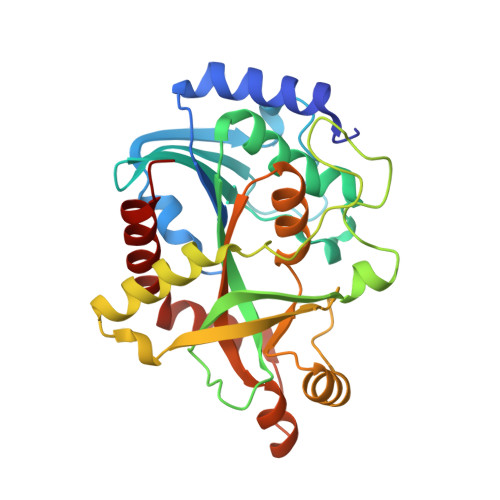The molecular structure of Schistosoma mansoni PNP isoform 2 provides insights into the nucleoside selectivity of PNPs.
Torini, J.R., Romanello, L., Batista, F.A.H., Serrao, V.H.B., Faheem, M., Zeraik, A.E., Bird, L., Nettleship, J., Reddivari, Y., Owens, R., DeMarco, R., Borges, J.C., Brandao-Neto, J., Pereira, H.D.(2018) PLoS One 13: e0203532-e0203532
- PubMed: 30192840
- DOI: https://doi.org/10.1371/journal.pone.0203532
- Primary Citation of Related Structures:
5CXQ, 5CXS, 5KO5, 5KO6, 5TBS, 5TBT, 5TBU - PubMed Abstract:
Purine nucleoside phosphorylases (PNPs) play an important role in the blood fluke parasite Schistosoma mansoni as a key enzyme of the purine salvage pathway. Here we present the structural and kinetic characterization of a new PNP isoform from S. mansoni, SmPNP2. Thermofluorescence screening of different ligands suggested cytidine and cytosine are potential ligands. The binding of cytosine and cytidine were confirmed by isothermal titration calorimetry, with a KD of 27 μM for cytosine, and a KM of 76.3 μM for cytidine. SmPNP2 also displays catalytic activity against inosine and adenosine, making it the first described PNP with robust catalytic activity towards both pyrimidines and purines. Crystal structures of SmPNP2 with different ligands were obtained and comparison of these structures with the previously described S. mansoni PNP (SmPNP1) provided clues for the unique capacity of SmPNP2 to bind pyrimidines. When compared with the structure of SmPNP1, substitutions in the vicinity of SmPNP2 active site alter the architecture of the nucleoside base binding site thus permitting an alternative binding mode for nucleosides, with a 180° rotation from the canonical binding mode. The remarkable plasticity of this binding site enhances our understanding of the correlation between structure and nucleotide selectivity, thus suggesting new ways to analyse PNP activity.
Organizational Affiliation:
Laboratório de Biologia Estrutural, Instituto de Física de São Carlos, Universidade de São Paulo, São Carlos, São Paulo, Brazil.
















